Toilet training a puppy is a crucial aspect of their development. It’s a significant milestone and, admittedly, often a challenging one for both the puppy and the human. Among the resources and advice that you’ll encounter in your toilet training journey, one strategy has proven to be particularly contentious: should you restrict your puppy’s water intake to assist in their potty training?
Water restriction as a method of toilet training invites important questions. But the main one is “Is it harmful or beneficial to withhold water from your pup”? This blog post aims to delve into these questions and explore the debate surrounding this method of toilet training.
In the following sections, we’ll discuss the importance of hydration for puppies, the role of water in potty training, and why there is an issue with removing access to water when potty training. By providing a balanced view, we hope to offer valuable insight and guidance as you navigate this important phase in your puppy’s life. Let’s explore together.
Should You Restrict Water For Your Dog Or Puppy?
The short answer is no. Water should not be restricted from your dog or puppy when toilet training.
As soon as puppy is on solid food (around 5 weeks of age) your puppy needs access to water.
Most animal welfare laws state that all animals (from dogs to cattle) need free access to water so your dog or puppy drink when they need water. And that’s very much just a fact. With young puppies it is incredibly important as it can very quickly turn into dehydration. And long term? It can result in things like resource guarding water sources, obsessive behavior, and apparent excessive thirst.
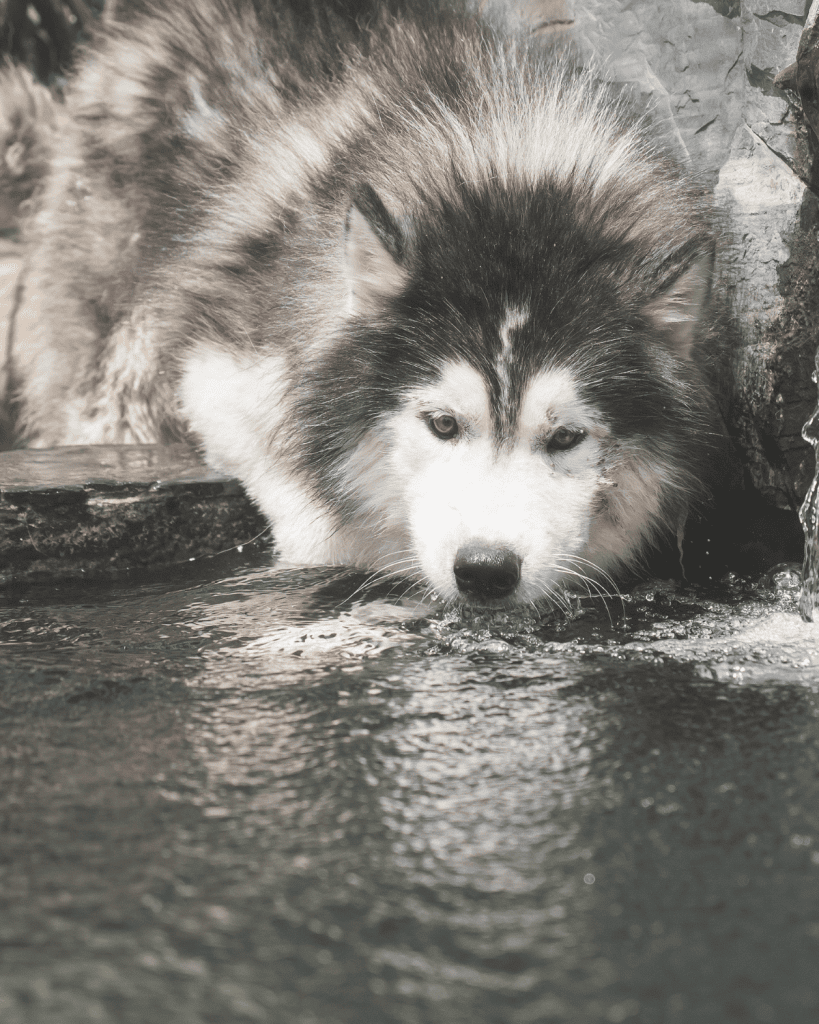
Understanding the Importance of Hydration for Puppies
For all living beings, including our fur-babies, adequate hydration is crucial for maintaining good health. Puppies are no exception. Their bodies are composed of approximately 80% water, higher than the 60% in adult dogs or humans. This high water content underscores the vital role that water plays in the healthy growth and development of a puppy.
Water aids significantly in a puppy’s bodily functions. It helps in digestion and absorption of nutrients, regulates body temperature, lubricates the joints, aids in oxygen and nutrient transportation through the bloodstream, and eliminates waste through urination and defecation.
The required daily water intake for puppies mainly depends on their body weight. Generally, a puppy should consume about one cup of water for every ten pounds of body weight. However, factors like diet (puppies on a dry kibble, or dehydrated food or high sodium diet may require more fresh water intake to get enough water), environment, and level of activity can influence this.
The flip side of the coin is the risk of dehydration. Dehydration in puppies can occur quickly and turn serious if not promptly addressed. If a puppy becomes dehydrated, it may experience loss of appetite, lethargy, sunken eyes, dry mouth, and elevated heart rate. In the most extreme cases, dehydration can lead to organ failure and be life-threatening.
Any restriction in water supply needs to be judiciously managed to prevent dehydration. It is critical to balance the goal of toilet training with ensuring that the puppy gets the hydration necessary for its overall health and well-being.
In essence, while water consumption does play a role in a pup’s toileting schedule, it’s imperative to remember the vital role water plays in their health. Understanding this can help you navigate the difficult question of whether or not to restrict your puppy’s water intake as part of toilet training.
The Role of Water Intake in Puppy Toilet Training
Toilet training is an essential milestone in your puppy’s development. However, water intake plays a significant role in the toilet training process. Some pet parents might consider adjusting water intake to aid potty training, but this can be dangerous and isn’t recommended.
Keep in mind that restricting water can have serious repercussions for your puppy’s health and wellbeing. In fact, animal welfare laws and veterinarian guidelines urge owners to provide unrestricted access to clean water at all times. Not providing this essential access to water for your puppy is against best practices and could even equate to mistreatment or neglect.
While it’s natural to assume that limiting a puppy’s water intake could, in theory, help control urination frequency and ultimately aid in toilet training, it’s not without risks. Depriving a puppy of water can lead to dehydration, which can cause several health issues like lethargy, loss of appetite, and in severe cases, organ failure. Furthermore, insufficient water intake might predispose the puppy to a higher risk of developing urinary tract infections.
It is important to remember that a puppy’s primary need is to stay healthy and properly hydrated. Strike a balance between offering them the necessary amount of water and attempting toilet training. To ensure your puppy’s welfare, it is always better to focus on non-restrictive training methods.
In the following sections of this article, we will explore various opinions on water restriction and discuss alternative strategies helpful for puppy toilet training that do not involve compromising your puppy’s access to essential hydration. These methods will prioritize both effective training and adherence to animal welfare standards.
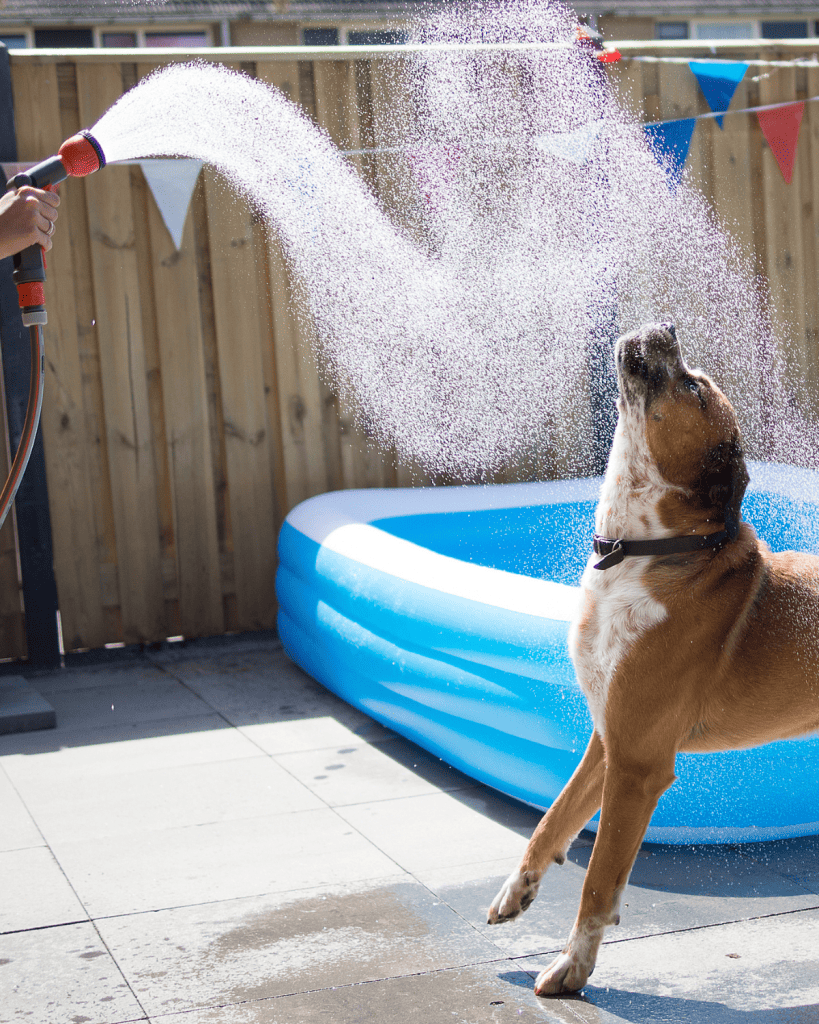
How to Toilet Train Puppies While Providing Unrestricted Water Access
Toilet training your puppy doesn’t have to involve restricting their water access. With patience and positivity, you can help them learn good bathroom habits whilst ensuring their health and hydration needs are met. Here’s a simple guideline:
1 – Set Routine Times for Eating, Drinking, and Potty Breaks
Puppies thrive on routine. Set a schedule for feeding, drinking, and toilet breaks, making sure to offer your puppy water after meals, and after playing or exercising. Then, take your puppy for a potty break approximately 15 minutes after they drink water. This predictable routine helps them understand when it’s time to ‘go.’
2 – Take Them Out Frequently
Puppies have small bladders, so they need to urinate quite frequently. Ensure regular breaks for your pup to visit the bathroom, ideally every 1-2 hours (as a rule of thumb). This frequency may be more during their active periods and less during rest periods. Regular trips outside or to a designated indoor spot can help prevent accidents.

3 – Encourage Good Behavior
When your puppy relieves themselves at the appropriate place and time, be sure to reward them. This could include verbal praise, treats, or playtime as positive reinforcement. This encourages your puppy to repeat the behavior, speeding up the training process.
4 – Nighttime Breaks
Increased hydration before sleep can lead to nighttime accidents. However, complete water restriction isn’t the solution. Offer your puppy a generous amount of water access during the day, leading them to naturally reduce their intake when it’s near bedtime. Also, take your puppy out for a final potty break just before bed.
5 – Be Patient and Positive
Toilet training can be a challenging process that requires time and patience. There will be accidents, but remember, your puppy will not learn as effectively from punishment as they do from positive reinforcement. Keep a positive attitude and be patient with them.
In conclusion, it’s possible to effectively toilet train your puppy without limiting their necessary water intake. By adhering to these guidelines, you preserve their health and well-being, all while teaching them to navigate their bathroom habits appropriately.
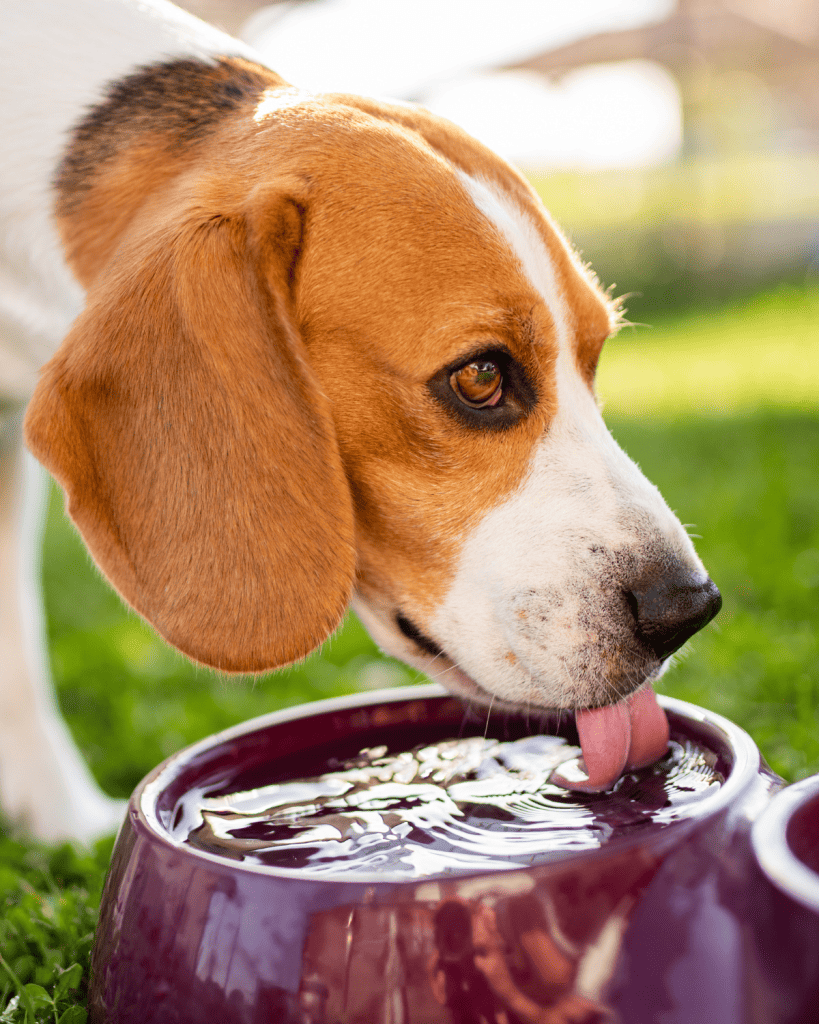
How Much Water Do Puppy’s Need?
The amount of water puppies require each day depends on multiple factors including their age, weight, diet, activity level, weather conditions, and health.
Puppies should have unrestricted access to fresh, clean water. They nominally need at least an ounce of water per pound of body weight daily. Diet alters water intake as dry food increases water requirements compared to wet food. Due to their high energy levels, puppies require more water when active, especially during hot weather or in arid climates.

Health conditions like fever, vomiting, or diarrhea can elevate a puppy’s water needs, and in such cases, a vet’s advice should be sought. It’s critical to monitor puppies for signs of dehydration or excessive drinking, which could point to underlying health issues like urinary tract infection and kidney disease thus warranting regular vet visits.
The flip side is also water intoxication when they drink a lot of water, and is something to be aware of in the hot weather, and can be particularly brought on with ice cubes. But if you’re concerned about your dog’s water intake you can always keep a journal too.
But, there are a number of things that can affect how much water your dog is going to need such as;
- Weather: Hot days your dog will likely drink more
- Food: dry dog food like kibble will require more water for your dog to process compared to a wet food diet or raw diets.
- Activity: More active dogs will drink more water!
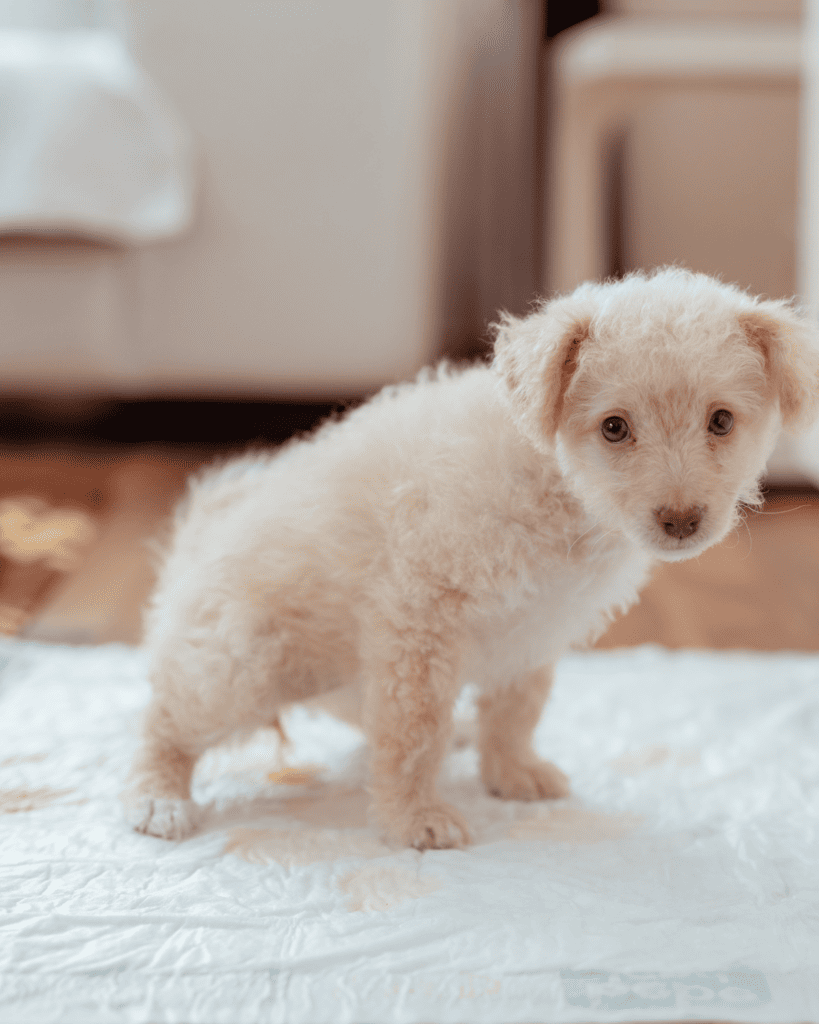
Water Is Life
In summary, proper water intake is crucial for puppies, not only for maintaining their health but also for mastering toilet training. Pet parents should avoid water restriction methods while focusing on positive reinforcement and routine-based approaches for effective toilet training without putting the dog’s health at risk.
Determining the optimal water intake for puppies involves considering various factors, including age, weight, diet, activity level, weather conditions, and health. Ensuring constant access to fresh, clean water allows puppies to self-regulate their intake appropriately.
Observing your puppy’s hydration levels and behavior, along with regular veterinarian visits, can help identify potential health issues early on and ensure that their water needs are being adequately met. By prioritizing the balance between effective toilet training and promoting a healthy hydration routine, pet owners can set the stage for a happy, well-adjusted, and healthy dog that will grow alongside them.
If you want help raising your puppy and how to do it right? Go grab a puppy bundle!

Author, Ali Smith
Ali Smith is a professional, qualified, and multi-award winning trainer is the founder of rebarkable. She has always believed animals deserve kindness and champions force free methods. Believing that dog guardians will all choose the kindest options if proper information is provided, she aims to help all dog guardians who need it and make dog training as accessible as possible
Ali lives win Maryland, US with her husband and her three dogs.
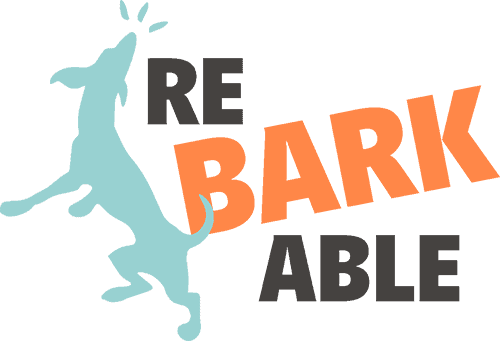



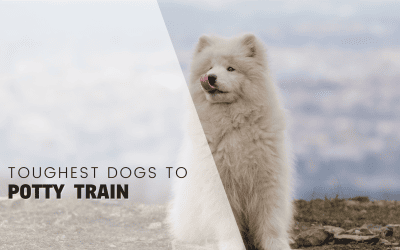

0 Comments